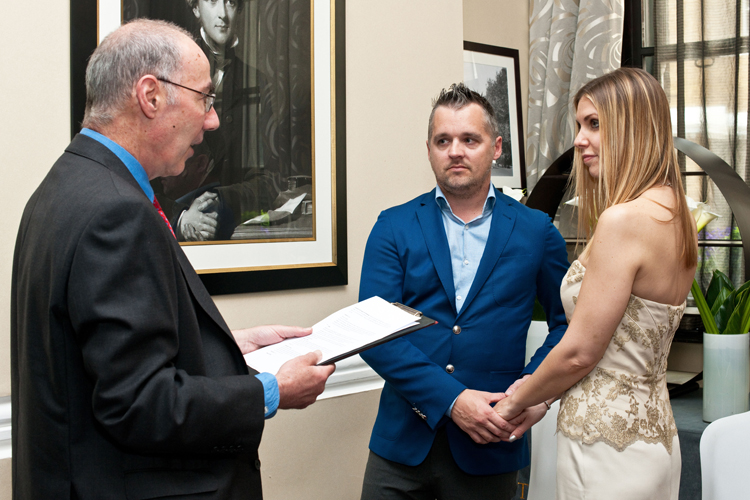
by Michael | Nov 7, 2022 | Blog
Getting Started
Planning your wedding can be fun and really exciting. You’re working together with your loved one (well, usually!) and you’ve got a wonderful target in mind. You can watch the elements gradually coming together and your vision becoming a reality.
That doesn’t mean to say that it‘s simple!
You’ll have to do a lot of thinking (for starters, what budget are you setting?) and be prepared to compromise.
Considerations
You’ll need to weigh up the ceremony you’ll be having. Do you want religion in it at all? If partially, which elements? Do you want a traditional ceremony, a partly wacky one, or a woo-woo one?
How much professional help are you going to go for, or what will you arrange yourselves?
Then, there’s the entertainment and catering (which are not really my remit).
The guest list is a potential minefield. How many people will you invite? Who will you leave off the list?!
You may have to consider a whole raft of suppliers. These could include:
Civil celebrant (obviously!); venue, photographer/videographer; musicians; make-up artist; florist; hairdresser; clothes supplier; entertainment; caterers; transport.
The date and even time may require some discussion.
Help
I cover all this fully in my book “Your Wedding Guide” (by Michael Gordon), which is still available on Amazon for a fiver.
Alternatively, feel free to contact me for more advice.
photo: Victor Shack
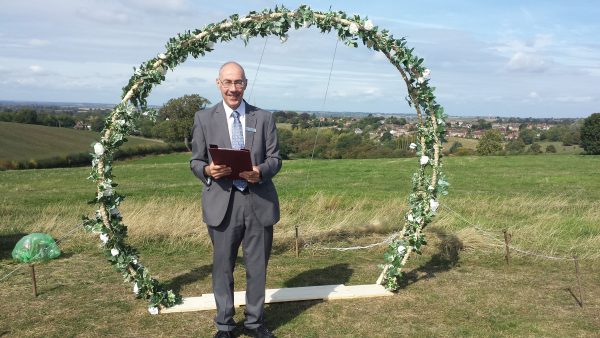
by Michael | Apr 26, 2021 | Blog
Most people have little, or no, experience of putting together a ceremony. The internet can offer some help, but consulting a professional is wise. However, how do you know which supplier is going to be a match for you?
Of course, you’ve got to decide what you want and how much you are willing to spend. One rule of thumb is that, if you really like someone but they’re just out of your price range, it’s worth going with them. You can probably cut a corner elsewhere to cover the shortfall.
I’m not going to talk here about the reception, as my brief is the ceremony. There are still decisions to be made, though.
The venue and the officiant are paramount – and will each have their own advantages as well as potential drawbacks.
Venue
If you are not marrying in church, you essentially have two choices: the Register Office or a venue such as a hotel. If the venue is not licensed for weddings, you need to go to the Register Office first (with two witnesses). Then you can have the wedding of your dreams (see next section) in the venue of your dreams.
If you’re choosing a hotel, say, make sure you have visited – and love – it. Ensure you have spoken to the Event Planner and understand exactly what the terms and conditions are. For example, does your hire cover the whole venue? What about payment terms? What social distance safeguards are they employing? What happens if you have to cancel?
Celebrant
If you’re going with a celebrant as officiant, there are many different types. Humanists should not even mention “God” or include any religious elements in their service (though a few do seem to be doing that nowadays). Wiccan celebrants will include pagan (nature-related) elements. Then there are independent celebrants who will include some conventional religious readings or rituals, if desired, but who are comfortable with secular ceremonies.
To clarify, an independent civil celebrant will normally tailor the service to your expectations and beliefs, so you can have as much – or as little – religion as you want. Your day really can be special and the way YOU want it.
Choices
Finally, you need to be sure of venue and celebrant (especially, as you’ll want to be comfortable for your actual marriage).
Personal recommendations are always good. Otherwise, websites will give you an idea, but personal contact is even more revealing. Is this a venue that excites you? Will this celebrant listen to your wishes and be someone you can feel confident about?
Don’t be afraid to ask questions. Check Terms and Conditions and query anything unclear.
If you have any questions in the meanwhile, please feel free to ask me!
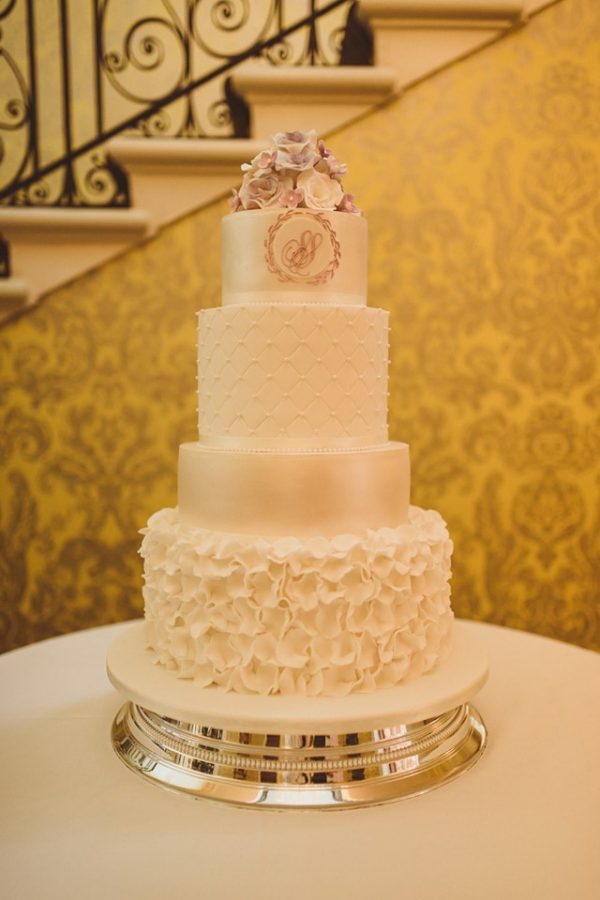
by Michael | Feb 24, 2020 | Blog
With it
being Shrove Tuesday today, my thoughts – not unnaturally – have turned to food
and drink. Obviously, today is technically a religious day, and many religions feature
food and drink in their festivals. None more so than Judaism, I’d say.
One example
is due in a matter of a week or two. That is the festival of Purim, and the
eating of hamantaschen – Haman’s ears, or poppy-seed parcels – is closely
associated with this. (Haman is the villain of the story.)
I don’t often conduct full religious ceremonies, but, every so often my services include some emphasis on food or drink. Perhaps that will give you an appetite (sorry!) to include something similar in your ceremony.
Drink
A
very popular, simple ritual at a wedding can be the Loving Cup. In this case, a
goblet of wine (or whatever drink the couple prefer) is prepared. Bride and
groom will sip three times from the goblet, passing it to each other each time.
I ask them
to drink to the love they’ve shared in the past. Next, to drink to their love
in the present, on this their wedding day. And finally to drink
to their love in the future and forever more.
On one memorable occasion the groom was extremely nervous. He took the
invitation to ‘sip’ to mean ‘gulp’. The alcohol clearly went to his head and he
became very relaxed and amusing for the rest of the ceremony!
Food
Although this can only be relevant to a limited number of readers, a
lovely ritual I have witnessed comes from Russia.
The bride’s mother bakes a large plaited loaf of bread. At the appointed
time, both bride and groom start eating it – from the opposite ends. They take
one bite each.
My role was to ask the guests to judge who took the bigger piece and I pointed
out that whoever
gets the bigger piece will be assured to be the head of the household! (I think
the bride always wins!)
So, as you tuck into your pancakes, give some thought to the value of food and drink! If you want to talk to me about rituals, then feel free!
Photo: Matt Penberthy
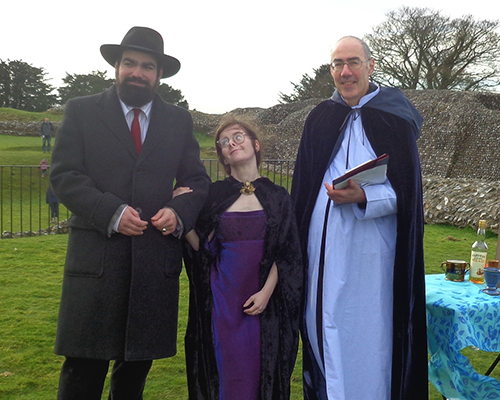
by Michael | Apr 19, 2019 | Blog
It’s festival season at the moment! Whether you’re Christian or Jewish, there’s plenty going on. (Sorry if I’m unaware of other religious festivals that may be coinciding!)
Obviously, I’m
talking about Easter and Passover. The two are connected, of course. They both
last quite a while and the Last Supper was a Passover meal. Both
religions include eggs in their festivities (a symbol of Spring).
Despite
appearances, I wasn’t really intending to talk about the festivals themselves.
But I did want to have a religious slant to my blog at such a time.
A big question
People often ask me about my religious beliefs. How can I offer mixed-faith ceremonies? Even if I believe in either of the two religions, what about the other one(s)? And, as I’m not ordained, surely I can’t legitimately conduct such ceremonies?
Valid questions, and ones I have had to think hard about.
A small answer!
Let me take the last point first. I do not see that being a lay person prevents me from uttering holy words. I always tell my clients at the outset that I am not ordained and make no pretence about it. Moreover, even if I do not necessarily believe all the tenets of a particular religion, I feel happy enough to say the words. The words must not offend me, of course. I approve of a lot of Buddhist philosophy, so, though no Buddhist myself, would be happy to read appropriate texts.
When I was asked to do my first pagan ceremony (half a dozen years ago), my first reaction was “no!”. I had no intention of biting the head off a chicken, or whatever!
However, when I looked into it, I realised that paganism is nothing like that. It’s nature-centred and many of the prayers are really beautiful. I accepted the invitation. In fact, I greatly enjoyed the ceremony, and was so glad I had agreed to take it on.
Integrity
So that’s my answer to those questions. I don’t feel I’m being a hypocrite by reading words that I may not fully endorse. They are still valuable and valid. I’m not forcing myself to say words that upset me. I’m not misleading anybody into believing that they are booking a full-blown priest (or whatever). Moreover, I’m increasing my knowledge and understanding of other cultures, and that has got to be for the good.
So, without
remorse, let me sincerely wish you a very happy Easter or Passover!
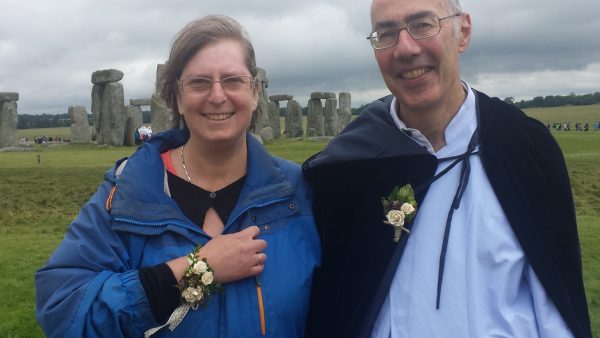
by Michael | Jan 21, 2019 | Blog
January is often a depressing time of the year (although potentially exciting). My posts are usually reasonably optimistic, as it is, but I particularly felt that a light-hearted piece was appropriate. What would fit best?
Finally, I opted for an account of a rather strange wedding I recently conducted.
There was already a mystery attached to this wedding before I even arrived. They had asked for a full religious wedding. That’s not an issue in itself, as I do offer religious (or part-religious) ceremonies quite often.
However, this couple were regular church attendees and I made it clear from the outset that I am not ordained. So why would they choose to work with me?
There may have been logistical reasons (maybe the priest wasn’t available). Or else personal reasons (perhaps they disliked the priest). Anyway, it came to the same. I was duly appointed and the build-up went quite smoothly. Everything seemed in hand on the eve of the wedding.
Kick-off was supposed to be 1.30 p.m. (a postponement from 12.45 only the week before). I allowed masses of time, as I had a long stretch of the M25 to cover,so, naturally, there were no traffic problems at all! I actually arrived around 11.45. Not unreasonably, the groom (let’s call him Martin) was not there yet.
Grooms tend to arrive between about 45 and 60 minutes before the ceremony start, so I occupied myself. It appeared that the bride was there (in a room,getting ready), so I knew I was in the right place.
The reception staff told me that the ceremony would be in the library, so I thought I’d familiarise myself with the layout. Not only did the library contain no books, but it didn’t even have bookshelves! Was this the right place?! It did, however, have about 40 decorated chairs (some 20 guests were expected), so I was somewhat reassured.
As the start time drew nearer, nobody appeared at the library. The reception knew nothing of Martin’s whereabouts, although a photographer had now materialised.
Twenty minutes before the ‘off’, it was like a ghost hotel. No groom, no guests, one photographer and an unseen bride. I decided to ring Martin.
“Oh, I’m in the car. I thought I’d buy some flowers for my fiancée. I’m on my way now.”
Bizarre as I found this, at least I had some sort of explanation, andI told him I’d await him in the library.
Nothing till 1.30 when Martin rang me. He had got lost, but had now arrived. Ten minutes later, still no sign of him. I rang him – he was being photographed!
At this point, a keyboard player and five guests turned up. Next, Martin actually showed up, very apologetic. He went off to get the bride, Winnie. So there was no procession, but, at 2.15, we were all together. Some of the guests were still missing, but Winnie insisted we began.
Five minutes in, no fewer than four photographers burst in, as did two more guests! As you can imagine, it was not the smoothest of ceremonies. To be fair, the couple took it seriously, and the rest of it actually went well. The other guests had opted to skip the ceremony, which I’d say was unusual.
It takes all sorts to make a world. I specialise in personalised ceremonies, so I am not one to criticise, but this was certainly a different approach.
Well, I hope it’s not too late to wish you all the very best for 2019. If you’re planning a ceremony this year, I trust it will be better organised than Martin’s was!
I’d certainly be glad to help you out.





